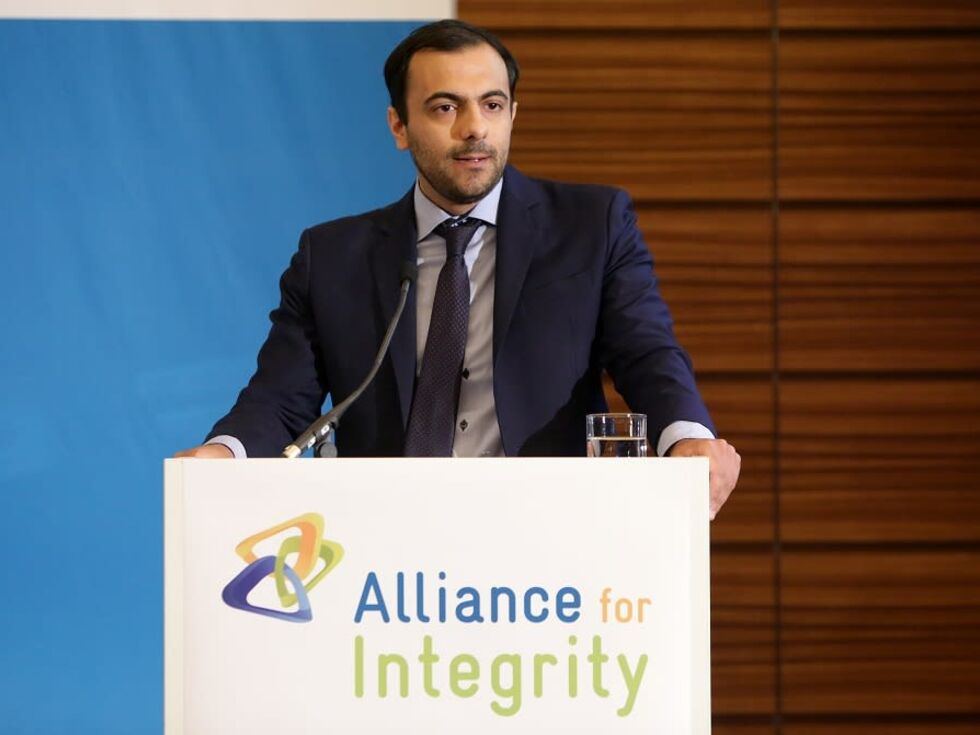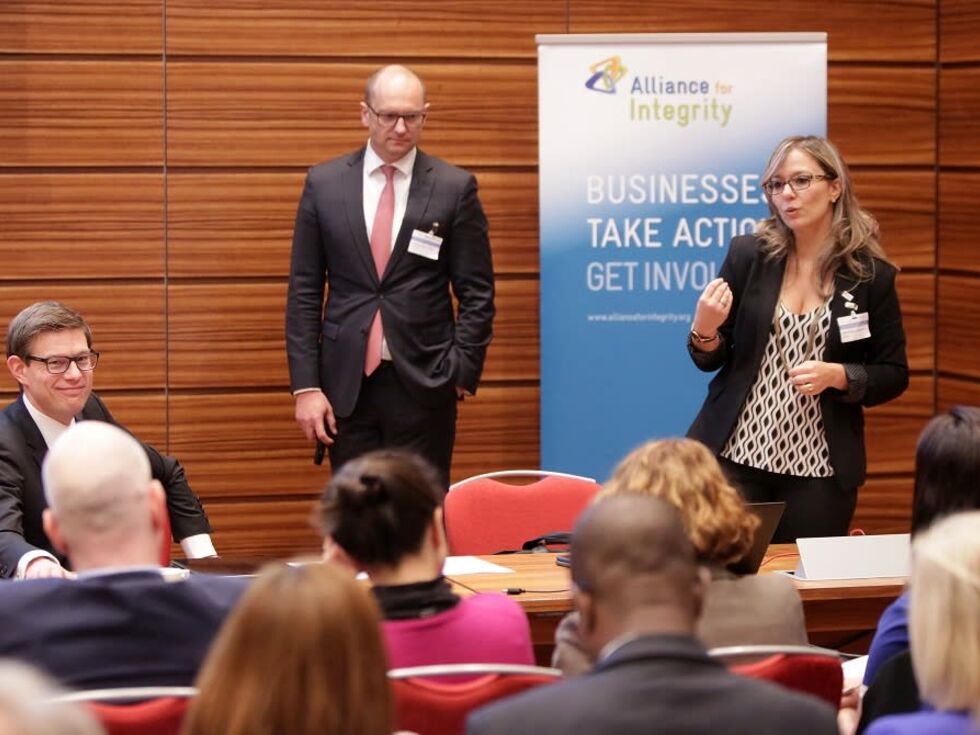Alliance for Integrity’s Global Conference on Integrity in the Digital Era
22.02.2018
Frankfurt, Germany

















Under the title „Implementing Business Integrity into Practice – Integrity in the Digital Era” the Alliance for Integrity’s Global Conference was successfully carried out in Frankfurt, Germany. More than 110 representatives from public and private sector, civil society as well as academia from various countries came together to discuss and reflect upon the implications of digitalisation for compliance and business integrity. Furthermore, the conference was followed online by over 150 viewers from around the globe.
Noor Naqschbandi, Director of the Alliance for Integrity, inaugurated the conference, stressing the far-reaching potential advanced technologies offer private and public sector alike in the fight against corruption. While the fusion of digitalisation and integrity is promising, offering manifold opportunities for more effective corruption prevention, Mr. Naqschbandi urged to take related risks and uncertainties seriously. Only by mitigating and anticipating these, the full potential of digitally integrated corruption prevention tools could be utilised to the benefit of societies. This welcome was followed by introductory remarks by Dirk Schwenzfeier, Commissioner for the Private Sector and Local Authorities at the German Federal Ministry for Economic Cooperation and Development (BMZ), highlighting the relevance of the private sec-tor engagement in respect of achieving the Sustainable Development Goals of the Agenda 2030. Further, he stressed the importance of stable and reliable legal frameworks as a basis for investments by the private sector. Subsequently, Wagner de Campos Rosário, Brazilian Minister of Transparency and Comptroller General of the Union (CGU), and Dr. Christoph Beier, Vice-Chair of the Management Board, Deutsche Gesellschaft für Internationale Zusammenarbeit (GIZ) GmbH, delivered keynote speeches. Both emphasised the topicality of the subject for international cooperation in the field of corruption prevention as well as the importance of digitalisation in that regard. Dr. Beier classified worldwide partnerships as the key to a sustainable economic development. Facing the digital change collectively and fostering multi-stakeholder partnerships, such as the Alliance for Integrity, simultaneously is an indispensable prerequisite towards an integer and compliant business environment.
In the following opening panel, the opportunities for the public and private sector to strengthen integrity, but also potential pitfalls were discussed. Oya Özarslan, Board Member of Transparency International and Chair of Transparency International Turkey, spoke about digitalisation opportunities in civil society’s anti-corruption efforts, best practices for gathering data and new methods to monitor private and public sec-tor activities. Dr. Mike Falke, Head of Section Governance and Human Rights at GIZ stressed that first there is the need for a political will for providing a reliable frame-work so that afterwards, the implementation of digital tools can follow. Private sector representatives, Alfredo Paredes, Chief Integrity Officer at Vesta, and Reynaldo Go-to, Compliance Officer at Siemens Brazil, pointed out that digitalisation brought tremendous opportunities for business integrity as well as sustainable economic growth and shared examples from their region. Candice Welsch, Chief of the Implementation Support Section Corruption and Economic Crime Branch at United Nations Office on Drugs and Crime (UNODC), drew attention on trends and good practice examples when it comes to the use of information and communication technology to prevent and combat corruption. Sherbir Panag, Partner at Law Offices of Panag & Babu, moderated the discussion.
Thereafter, Fernanda Cabral, Co-Founder of Imagina Coletivo, took the floor and delivered a speech on the potential of taking good choices not only in the business environment but also in our personal lives. She passed the word to Raymond Ahiadorme, Network Manager Ghana at the Alliance for Integrity, to launch TheIntegrityApp on the global level. The digital tool is an app and online platform that allows small and medium-sized enterprises (SMEs) to self-assess their level of compliance and guide them to tools and resources to further build their capacities. At the same time, TheIntegrityApp allows larger companies to monitor and improve the level of compliance among companies in their supply chain. It is now available in English, Portuguese, and Spanish.
During the lunch break, participants had the chance to network and stroll around the Conference’s market place. They were able to get in touch with representatives from the Alliance for Integrity, the GIZ Sector Programme for Anti-Corruption and Integrity, the global project Illicit Financial Flows (GIZ), the International Anti-Corruption Academy (IACA), the Organisation for Cooperation and Economic Development (OECD), Transparency International, and the Water Integrity Network (WIN).
After the break, the second panel on digital compliance in emerging market economies kicked off. The focus of this session lay on compliance in global supply chains. Gemma Aiolfi, Head of Compliance & Corporate Governance at the Basel Institute on Governance, and Jorge Bermúdez Soto, Comptroller General of Chile took part in the panel. Additionally, the panel was joined by Elodie Beth, Programme Advisor of Transparency, Accountability and Anti-Corruption at United Nations Development Programme (UNDP) Bangkok, Theo Hesselink, Technical Officer of the Compliance and Faciliation Directorate at the World Customs Organization, and Steven Pope, Vice President of Customs & Regulatory Affairs at DHL Express Europe. The panelists debated lively how governments could contribute to create enabling framework conditions for successfully implemented digital solutions in global supply chains that contribute to clean business. Solutions focused on e-customs, e-tenders and e-procurement that not only hold the possibility to attract foreign investment, but could also help SMEs to become more competitive in global comparison. Mattia Wegmann, Programme Manager at the Alliance for Trade Facilitation (GIZ), moderated the panel.
For the plenary session Prof. Dr. Tobias Keber, Chair of Institute for Digital Ethics Stuttgart Media University shared his thoughts on ethics and fostering integrity in the age of digitalisation. Professor Keber presented ten ethical guidelines companies should integrate into their strategy when starting digitalisation processes.
The ensuing parallel break-out sessions offered the participants practical insights into the topic. Break-out session 1 was moderated by Amanda Rocha from the Alliance for Integrity and organised in cooperation with DICO (Deutsches Institut für Compliance) e.V., raised the question what the Compliance Officer of the future will look like – it if will be a wo(man) or a machine. Roberta Codignoto, Head of the Legal and Compliance Department for Latin America at Staples, Alexander Geschonneck, Head of Compliance & Forensic at KPMG AG and Head of Working Group Digital Transformation at DICO e.V., and Dr. Jan-Hendrik Gnändiger, Accountant Compliance & Forensic at KPMG AG, talked about digital transformation and compliance. In the second break-out session, Silvina Coria, Global Head of Risk and Compliance at OLX, Daniela Jiménez, Member at Victoria 147 and Co-Founder of DITEM, and Bright Simons, President of mPedigree took a look at the importance of integrity for start-ups and tech-companies. The central question in this session revolved around the notion of whether integrity and innovation were antonyms or two sides of the same coin. Nandini Sharma, Network Manager India at the Alliance for Integrity, moderated this session. The third session, which was moderated by Daniela Patiño Patiñeros, Global Compact Network Colombia, dealt with the new promising tools digitalisation is offering the public sector in particular. E-procurement, e-tenders, e-customs and online registers might well improve public services substantially and ensure clean business. Besides the advantages, Rhoda Appiah, Head of Corporate Affairs and Administration and the Public Procurement Authority Ghana and Paulo Magina, Head of Public Procurement Unit at OECD also reflected upon the challenges the public sector is facing when implementing e-tools and gave some indications how to overcome these. After the break-out sessions, each group’s results and short insight of the discussed topics were presented in the plenary session
In his closing remarks, Noor Naqschbandi stated that the Alliance for Integrity is looking forward to continued cooperation with the different stakeholders on the is-sue of compliance and anti-corruption. He thanked the participants for their interest and their contribution to the success of the event. Furthermore, he thanked all partners and supporters for their ongoing support on the ground and in Germany. Silvia Heer from the German Ministry of Economic Cooperation and Development (BMZ) concluded the event by thanking the Director of the Alliance for Integrity, Mr. Naqschbandi, for his work in the past few years and wished him all the best for his new position within GIZ in India.





